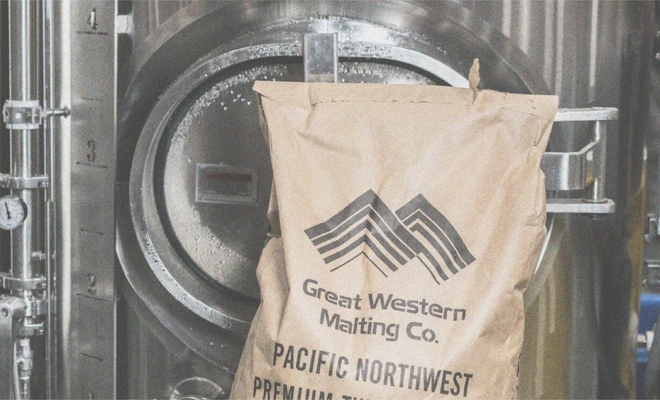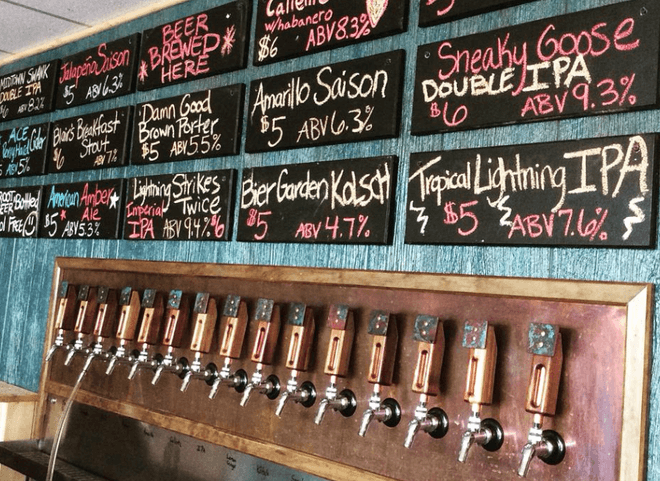Bringing Approachability Back To Beer

Lost Nomad Brewing Company started exactly two years ago to the day, albeit in a different form. Today, our mission is to bring a guided approach to craft beer that allows you to explore the world through fermentation. A lot of breweries make good beer, and many also make a wide variety of great beer. When presented with the typical, vast tap menu we think folks new to beer struggle with where to start and beer aficionados plateau in their knowledge growth.
It felt appropriate to use today to kick off the first entry in our journey as a start-up brewery, share how we got here (as concise as I can, I promise), and outline our vision with immediate next steps. I’ve been telling pieces of this story for the last couple years and I’m excited to finally write down what’s been rattling around in my head, and on bad pitch decks, since I decided to take this venture seriously.
This is my attempt to catch you up on the story of Lost Nomad from the inception of the idea to running a pop-up brewery overseas.
Note: I will use the terms “I” and “we” interchangeably. My wife is essentially an unwitting angel investor in Lost Nomad, and arguably came up with the name on a road trip, so her inclusion turns this from “my” brewery to “ours.”
HOW WE GOT HERE
I got bitten by the entrepreneurial bug years ago and in January 2021, I decided to focus on starting a brewery. I’d been homebrewing for a decade and it’s the thing I could see myself doing at 2am (at which time I’d rather be debugging a glycol chiller than software) and for the rest of my life. I didn’t know much about industrial scale brewing (aka running a factory) so I used 2021 to learn as much as I could and prepare for the UC Davis Master Brewers certificate program. Lots of conferences and workshops went all virtual during Covid which was lucky timing. I even became a Certified Beer Server. I reached out to local brewers and picked their brains–a huge benefit from being in the craft beer space is the willingness of others to help and I’m hugely grateful for that.
GENIE IS OUT OF THE GROWLER
Inspiration came when my wife and I visited White Labs tap room out on the east coast in Asheville, NC. I loved the idea that you could keep a base recipe of beer constant and change the yeast to showcase the differences. I thought the tap list organization and transparency was a novel approach while also providing something to both new and experienced beer drinkers.
For a while I had been toying with modular recipes where you could add one ingredient to a foundational recipe and yield a totally different style, and I thought this would be an interesting concept with which to start planning. It’s unique and makes sense from a business perspective given that common ingredients streamline the logistics of running the brewery.
FEEDBACK…FOR BETTER OR WORSE
A buddy of mine and I put together a pitch for Beer Lab, our placeholder name that’s absolutely impossible to trademark but allowed us to get rapid feedback on the concept. Bright-eyed, we pitched this concept at Craft Beer & Brewing Magazine’s Brewery Accelerator Workshop…and it was completely polarizing. The panel of judges, and other attendees, either loved it or absolutely hated it. Coming from a tech background, I knew…a certain kind of pitch…and that’s how we presented. Feedback from one judge was “I feel like I need to download an app to drink your beer.” Our pitch was unlike any others–polished and rehearsed, but lacking a single bit of soul or personality. Lesson learned: making beer is highly personal. Your story is core to your concept and is as important as the quality of your product.
For better or worse, we got the feedback we were looking for and early enough we didn’t sink significant money into the Beer Lab concept at that point. I thought the entire workshop was great for so many reasons and I’m looking forward to going back to the same accelerator in the future. Anyone with a brewery in planning should check it out.
IDEA: LOST NOMAD
I spent the second half of 2021 thinking about how we should morph the Beer Lab concept with a better story, or at least something more relatable than “hey isn’t it cool that you can change one ingredient and get a totally different beer.” The brewery needed a story. A soul. The solution, for us, was staring right at us.
For our entire professional lives, my wife and I have moved constantly for work. Like gypsies, we became semi-pro at quickly setting up our new home, integrating with the local community, and exploring as much of our surroundings as possible before packing up again. Ironically, we were discussing the brewery on a road trip and settled on both the concept and the name: what if we showcased differences in styles of beer based on where they’re brewed? Geography, travel, and cultural differences in ingredients are all highly-relatable; more than that, they mean a lot to us personally given that beer is a common way my wife and I explore new places.
Unnamed brewery to protect the innocent
Instead of adding to the problem of expansive tap lists, packaging the concept around geography makes our beer more approachable. New beer drinkers may not know the difference between an ale and a lager, but they remember that beer they had on the beach in Mexico. And when it’s placed adjacent to, say, a Haitian lager that same customer has a handrail for what they should try next. Better, experienced beer drinkers get to appreciate the breadth of beer styles as they’re brewed across the globe with culturally unique ingredients.
I didn’t have another brewery accelerator to solicit feedback but I pitched my new concept to friends and family, and eventually CODO Design to kick off core design work. I won’t belabor what they’ve already written about working together, but suffice it to say they’re an incredible team and they have my business for the life of both of our businesses. 2021 wraps up with CODO knee-deep in creating brand assets for Lost Nomad and trademark paperwork (intent-to-use) filed. Shout out: Candice is incredible (and brutally honest), do reach out to her if you're starting a brewery.
WHAT’S NEXT
2022 was spent planning how to execute the Lost Nomad concept. We eventually learned where we’d be moving with an ETA of December 2022. Our new location on the edge of the Sahara in West Africa…posed some challenges. There were a few approaches to consider:
- Contract brew in a target market in the United States: I’m going to need to do this anyway to obtain a registered trademark, so file this one as “yes, let’s do it.”
- Open a brick-and-mortar in the United States: my wife and I have spent years living apart due to being professional nomads, and I’m not eager to voluntarily live apart for the foreseeable future. Less importantly, I’d like to test the concept as much as I can before sinking a lot of capital into a physical location. So file this one as “not yet.”
- Work for an established brewery: I’m a firm believer in doing the real thing. This would be fun, but less informative albeit I’m sure it would help mitigate some risk to my own business. Regardless, there’s no brewery in our current location so this is a “no.”
- Open a local brewery at your location overseas: I’d love to but the short answer to this is “not yet.”
I can’t open a brewery to the public at our location. There’s not a brewery around to work at even if I wanted to. I like being married so working at a brewery back in the US isn’t an option. Is there a way to validate the concept beyond contract brewing?
IF YOU CAN BREW IN THE SAHARA, YOU CAN BREW ANYWHERE
The idea of finding your edge stuck with me as a grad student trying to publish papers in my field and now as the founder of a start-up brewery. What stuck out to me is:
- I can provide beer strictly to the local diplomatic community (any registered diplomat from a country with a presence here) and their family members, which results in a total addressable market of, well, more than I’d be allowed in the US without TTB licensing. On the order of hundreds of customers.
- I live in a location that adds to the Lost Nomad story.
- I have access to ingredients that add to the Lost Nomad story.
- I have a captive customer segment that I’m targeting and, most importantly, is opinionated about beer.
- You can’t open a garage brewery legally in the US, but here I can iterate faster on the concept and receive the feedback you can only get by opening a tap room or contract brewing in the US.
If 2021 and 2022 were the planning years, 2023 is the year of concept validation. We’re going to build the brand foundation through in-person and online engagement using tap room events, social media, and explorer reports from folks sending us interesting ideas to try as they travel the globe themselves.
I’m excited to launch this next phase of Lost Nomad Brewing Company this year, and based on feedback (for better or worse) we’ll answer the question: does the idea of experiencing beer based on geographical differences resonate with customers? I hope so–let’s get started.
